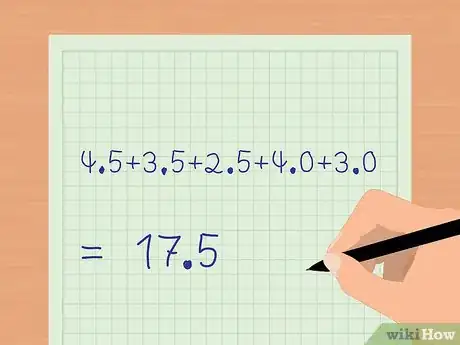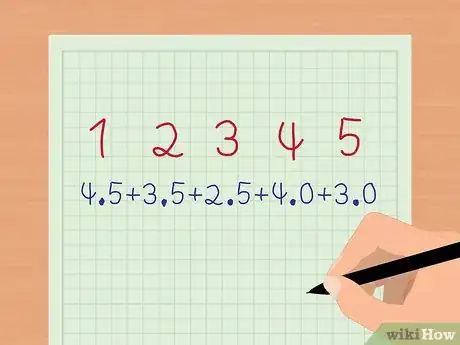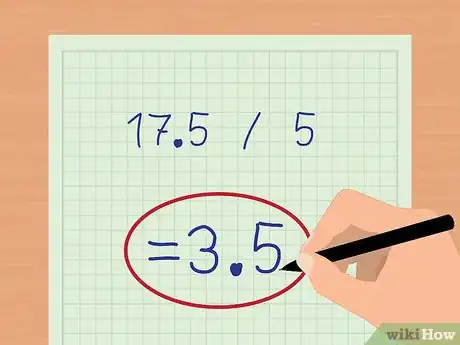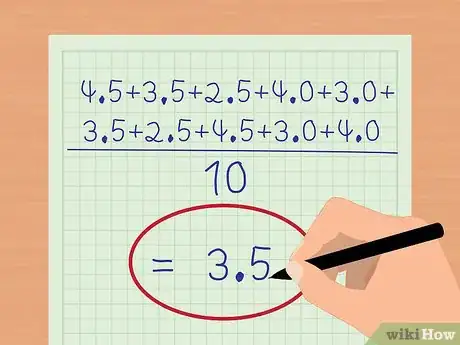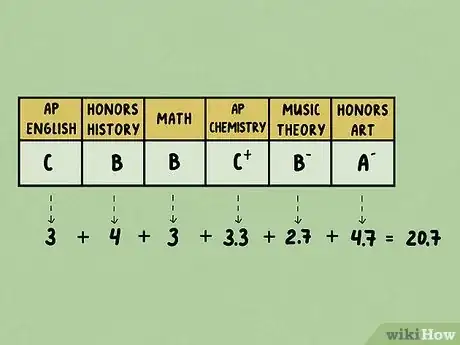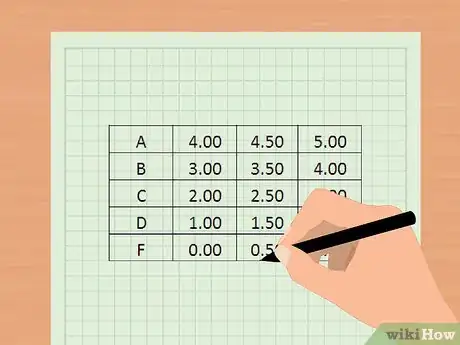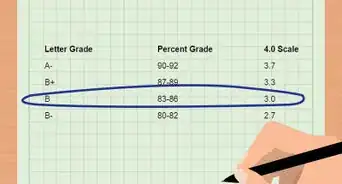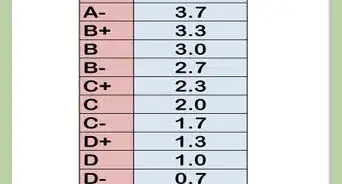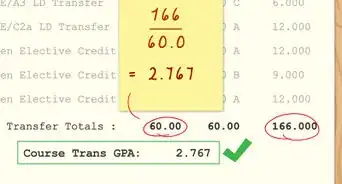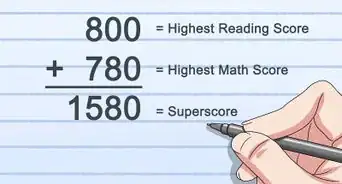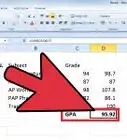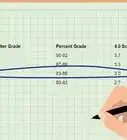This article was co-authored by Felipe Corredor. Felipe is a Senior College Admissions Consultant at American College Counselors with over seven years of experience. He specializes in helping clients from all around the world gain admission into America's top universities through private, one-on-one consulting. He helps guide clients through the entire college admissions process and perfect every aspect of their college applications. Felipe earned a Bachelor's Degree from the University of Chicago and recently received his MBA.
This article has been viewed 147,952 times.
Calculating a weighted GPA may seem like a daunting task if you don't have someone to break it down for you. However, it's much easier than it seems. Basically, calculating your GPA is just figuring out an average, so if you can average numbers, you can calculate a weighted GPA once you know how your school weights the scale.
Steps
Figuring Out Your Weighted GPA
-
1Add the GPA for each class together. To figure out your GPA, you basically need to do an average of all your classes. The first step of averaging your GPA is adding all of them together.[1]
- So if your individual GPAs for classes are 4.5, 3.5, 2.5, 4.0, and 3.0, the total for those is 17.5.
- If your individual GPAs are 5.0, 4.0, 3.0, 4.0, and 3.0, then your total is 19.
-
2Count the number of individual GPAs. The next step in figuring out an average is counting the number of items you added together. In this case, you're averaging 5 items in both sets.[2]Advertisement
-
3Divide the total you added by the number of items. The next step is to divide the number of items, 5, into each total you added together. So if your total is 17.5, you divide 17.5 by 5 to get 3.5. So in the system that ups your honors classes by half a point, your GPA would be a 3.5 If your total was 19, you divide by 5 to get 3.8. Therefore, in the system that ups your honors classes by a whole point, your weighted GPA is 3.8.[3]
-
4Scale the average up or down. If you need to, you can add more or fewer numbers to the equation. For instance, if you have 10 classes, you just add all 10 of your GPAs together, and then divide by 10. If you have 15, you add all 15 together and divide by 15.[4]
Figuring Out Your GPA for Each Class
-
1Understand how the weighted GPA works. In some high school systems and college admission offices, classes that are considered to be of college level, such as Advanced Placement or International Baccalaureate, receive more points than other classes. They receive more points because they require more work and make you perform at a higher level.[5]
-
2Learn how your classes are weighted. Different school districts and even different universities weigh your GPA differently. For instance, some places add an extra half a point to grades for these classes, while other places add a full point.[6]
- Check your school's handbook to find out more. You may also find the information on your school or district website.
- If you're trying to figure out your GPA for college admissions, look on the admissions sections of the universities you're applying to. Each one may weight your GPA differently.
- Also, some schools do not add the extra points if you go below a C.
-
3Figure out the score for each class. For your advanced classes, add the extra number. For your regular classes, keep the number as it normally is.
- The normal GPA scale for grades is a 4.0 for an A, a 3.0 for a B, a 2.0 for a C, 1.0 for a D, and 0.0 for an F.
- In some weighted GPAs, the scale for honors or advanced classes is 4.5 for an A, 3.5 for a B, 2.5 for a C, 1.5 for a D, and 0.0 for an F, while your grades in other classes still use the normal scale. So if your grades for a semester were A, B, and C in honors classes and an A and B in regular classes, your GPA for each class would be 4.5, 3.5, 2.5, 4.0, and 3.0, respectively.
- In other weighted GPAs, the scale for honors and advanced classes is 5.0 for an A, 4.0 for a B, 3.0 for a C, 2.0 for a D, and 0.0 for an F, with some of them leaving off the extra for the D. Your regular classes still use the normal scale.[7] Therefore, if your grades for a semester were A, B, and C in honors classes and an A and B in regular classes, your GPA for each class would be 5.0, 4.0, 3.0, 4.0, and 3.0, respectively.
Community Q&A
-
QuestionIn my university our GPA is out of 5. My average GPA in the 6 semesters that I had in this university is 4.64; now I want to convert it to be out of 4.5 instead of 5. How can I convert it?
 Community AnswerYou can do it mathematically by setting up an equation: 4.64 / 5= x / 4.5. Then cross-multiply and you get 20.88 = 5x. Divide 20.88 by 5 and you will get your answer, which is 4.176.
Community AnswerYou can do it mathematically by setting up an equation: 4.64 / 5= x / 4.5. Then cross-multiply and you get 20.88 = 5x. Divide 20.88 by 5 and you will get your answer, which is 4.176.
Expert Interview
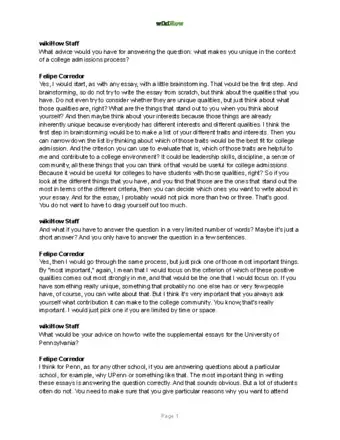
Thanks for reading our article! If you'd like to learn more about a weighted GPA, check out our in-depth interview with Felipe Corredor.
